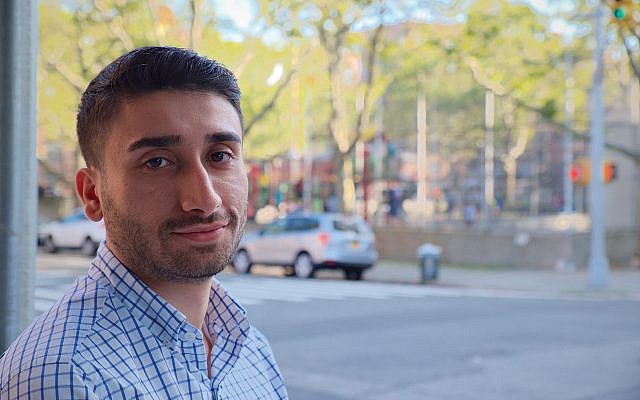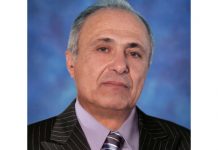
A councilwoman’s young director of community relations hopes to lead a civic awakening.
During the highly contested Queens district attorney election in June, when it seemed like progressive hopeful Tiffany Caban might defeat establishment Democrat Melinda Katz, an op-ed in the Bukharian Jewish Link, a local paper, lamented the Bukharian community’s poor voter turnout and Katz’s presumed loss.
“We had an opportunity to take back the Democratic Party — and there’s a good chance we failed,” it said.
Weeks later, a controversial recount crowned Katz the victor by a mere 60 votes. But the close call is sparking a new awareness among Bukharian leadership about the need for the roughly 60,000-strong community to be more politically involved.
“Our potential is huge,” said Boris Kandov, president of the Bukharian Jewish Congress of the United States and Canada, an umbrella group for various Bukharian organizations. “With thousands of people we can affect the election of any politician.”
But there aren’t many in the Bukharian community, whose members immigrated from Central Asia in the 1990s, with political experience. So at the center of this fledgling political awakening is David Aronov, 22, one of the few Bukharian Jews in politics.
“For Bukharians, politics was never important, because the importance was building up a family and having a stable job,” Aronov said about the lack of political engagement in the community.
He bucks that trend. Aronov works in the office of City Councilwoman Karen Koslowitz, who represents the 29th District, which covers the Queens neighborhoods of Rego Park, Forest Hills and Kew Gardens, the neighborhoods where most Bukharians live. He began his work with Koslowitz when he was 15 (first during summer internships), and he works full-time as the director of community relations. Aronov is also involved in registering voters through the Queens County Young Democrats.
Engaging the broader Queens community for Koslowitz means that Aronov does an informal kind of outreach for Bukharians, and knows how to navigate the varied pitfalls of the most ethnically diverse corner of the U.S. Here, Bukharians are easily stereotyped as flashy and pretentious by their neighbors, largely because of the size and architectural flourishes of their houses. In his work, Aronov counters that by introducing himself to non-Bukharian residents and helping them steer local issues.
“I go to the community board meetings, I go to the precinct council meetings and people know I’m Bukharian,” he said. “Somebody who lives among Bukharians, who doesn’t necessarily interact with them … when they actually meet somebody in a professional manner in a public setting, they might be like, ‘OK, they’re not that bad. Maybe I’ve just got to talk to them.’”
“It’s hard” to make connections with other groups, Aronov said, “because we’re an immigrant community and a tight-knit one, and we stick together. We don’t usually talk to people outside of the community.” But, he added, “I don’t feel under pressure because I’ve been doing this for seven years.”
Though Aronov is young, Kandov says, his experience is essential to mobilizing the Bukharian community in elections. He also sees Aronov as a future politician, perhaps the first Bukharian with a successful campaign. “We have a number of people who want to seriously get into politics,” he said. “But politics is a nuanced thing; you have to know how to understand it.”
Aronov isn’t looking ahead to a political run just yet. Bukharian leadership wants the community to be more politically involved, but actually realizing that is more difficult than it seems.
For example, though registering all eligible voters is the leadership’s current plan — “We’re trying to reach the entire community,” Kandov said — registering someone doesn’t guarantee they’ll go out and vote. And there’s always a question of engaging young Bukharians, who may need a unique pitch.
But Aronov has some ideas: Get rabbis and lay leaders talking about politics and elections more often in order to encourage the community to vote. And, maybe more ambitiously, Aronov has plans to start a Bukharian political action group, or PAC, through the Bukharian Jewish Union, a grassroots organization engaging young professional Bukharians.
Aronov’s political work, and the inspiration for more community involvement, comes from an immigrant ideology that mixes both fear and hope. “A big part of the immigrant narrative is xenophobia, discrimination, harassment,” he said, taking note of the current political climate, where open hostility to immigrants is the norm.
So, it’s important that Bukharians speak up and say “we’re not going anywhere, let’s live together, let’s make a society that works for all in a community that is prosperous and safe and flourishing. … We need to be active in our communities to make sure we’re not overlooked. That people recognize us. And that people care about our issues as well.”
This cultural and political awareness is more present among young Bukharians than the older generation of immigrants, Kandov says.
Young Bukharians “understand what’s going on in the country,” he said, “and of course they’re interested in participating in its future.” But Kandov added that youth, and the community as a whole, have to “not only be interested, but also to know how to influence and to have the right to vote.”
credit to jewishweek.com









